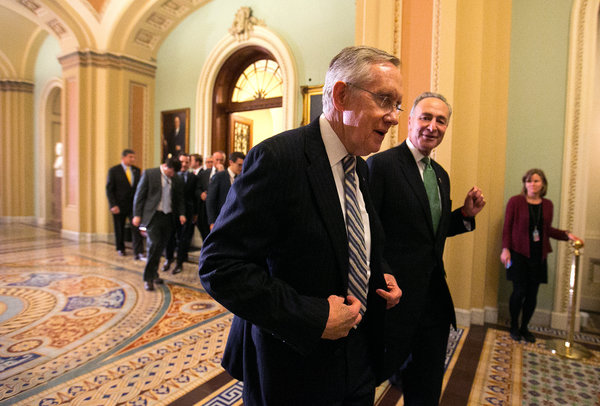
|
Congressional Republicans conceded defeat Wednesday in their bitter budget fight with President Obama over the new health care law, agreeing to end a disruptive 16-day government shutdown and extend federal borrowing power to avert a financial default with potential worldwide economic repercussions. With Treasury warning it could run out of money to pay U.S. obligations within a day, the Senate voted overwhelmingly, 81-18, on Wednesday evening to approve a proposal hammered out by Republican and Democratic leaders after the House was unable to move forward with any resolution. The House was expected to follow suit within hours and approve the Senate plan, which would finance the government through Jan. 15 and raise the debt limit through Feb. 7. Shortly after the vote, Mr. Obama praised Congress for action and said the vote cleared the way for substantive budget negotiations. "We now have an opportunity to focus on a sensible budget that is responsible, that is fair, that helps hard-working people all across this country,” he said. The result of the fight, which threatened the federal credit rating, was a near total defeat for the Republican conservatives who had engineered the budget impasse as a way to strip the new health care law of financing even as registration for benefits opened Oct. 1 or, failing that, to win delays in putting the program into place. Speaker John A. Boehner, the leader of conservative House Republicans whose push to strip money for the health law led to the shuttering of much of the government on Oct. 1, said that the House would not block a bipartisan agreement reached in the Senate that yielded virtually no concessions to the Republicans. “We fought the good fight,” Mr. Boehner said in an interview with the radio station WLW-AM in Cincinnati. “We just didn’t win.” In a statement issued as the Senate and the House prepared to vote on the proposal, Mr. Boehner said: “The fight will continue. But blocking the bipartisan agreement reached today by members of the Senate will not be a tactic for us.” The decision came about 24 hours before the Treasury was due to exhaust its borrowing authority, putting the nation on the brink of a default. Mr. Boehner had earlier told colleagues privately that he would not allow the nation to default. The Senate is expected to vote on the bill Wednesday evening, with final passage coming late Wednesday or early Thursday. Under the agreement, the government would be funded through Jan. 15, and the debt ceiling would be raised until Feb. 7. The Senate will take up a separate motion to instruct House and Senate negotiators to reach accord by Dec. 13 on a long-term blueprint for tax and spending policies over the next decade. Senator Mitch McConnell of Kentucky, the Republican leader, stressed that under the deal, which he negotiated with Senator Harry Reid of Nevada, the majority leader, budget cuts extracted in the 2011 fiscal showdown were not reversed, as some Democrats had wanted, a slim reed that not even he claimed as a significant victory. The deal, Mr. McConnell said, “is far less than many of us hoped for, quite frankly, but far better than what some had sought.” “It’s time for Republicans to unite behind other crucial goals,” he added. Chastened Senate Republicans said they hoped the outcome would be a learning experience for lawmakers in the House and the Senate who shut down the government in hopes of gutting Mr. Obama’s signature domestic achievement, the Affordable Care Act. Instead of using the twin deadlines of an end to government funding and borrowing authority to address the drivers of the federal deficit, conservatives focused on a law they could never undo as long as Mr. Obama is president, several senators said. “We took some bread crumbs and left an entire meal on the table,” said Senator Lindsey Graham, Republican of South Carolina. “This has been a really bad two weeks for the Republican Party.” Senator Richard Burr, Republican of North Carolina, took a swipe at Senators Ted Cruz, Republican of Texas, and Mike Lee, Republican of Utah, as well as House members who linked further funding of the government to gutting the health care law, which is financed by its own designated revenues and spending cuts. “Let’s just say sometimes learning what can’t be accomplished is an important long-term thing,” Mr. Burr said, “and hopefully for some of the members they’ve learned it’s impossible to defund mandatory programs by shutting down the federal government.” But while Mr. Cruz conceded defeat, he did not express contrition. “Unfortunately, the Washington establishment is failing to listen to the American people,” he said as he emerged from a meeting of Senate Republicans called to ratify the agreement. Mr. Cruz promised not to use parliamentary tactics to block a final vote, raising hopes that the government will be opened and the debt ceiling will be lifted before Thursday, when the Treasury exhausts its borrowing authority. “From our side, I don’t see any evidence of delay,” said Senator Rand Paul, Republican of Kentucky and a Cruz ally. Jay Carney, the White House press secretary, said that Mr. Obama supported the compromise reached by the Senate leaders, and he urged lawmakers in both chambers to pass it quickly. Mr. Carney said the agreement “achieves what’s necessary” to reopen the federal government after 16 days, and removes “the threat of economic brinksmanship” that raised the possibility of a government default. “We leave parliamentary procedures to the Congress,” he said. “But we obviously hope that each house will be able to act swiftly. We are already on Day 16 of a wholly unnecessary shutdown of government.” |
据美国媒体报道,当地时间10月16日晚,美国国会参众两院先后投票通过一项联邦政府临时拨款议案,同意结束持续多日的政府关门局面并提高联邦债务上限。由此,这场曾经一度僵持不下的预算纷争以国会共和党人做出重大让步而暂时告终,美联邦政府将很快恢复正常运作。 ***奥巴马赞许两党协作 距离美国触及债务上限不到24小时、整个国家被推向债务违约的边缘之际,参议院多数党即民主党领袖里德和共和党领袖麦康奈尔16日下午宣布达成协议。当晚,协议被提交至参议院全体会议投票表决获得通过。该议案决定为联邦政府拨款至明年1月15日,并临时提高联邦债务上限至明年2月7日。 随后,这份议案被迅速送交众议院表决。众议院议长、共和党人博纳16日表态不会阻挠议案在众议院的表决,果不其然,在民主党议员的一致支持和共和党少数议员的支持下,该议案在众议院以285票赞成、144票反对的投票结果顺利过关。 此前参议院投票通过议案的消息一经传开,美国总统奥巴马随即对国会此举表示嘉许,并称参议院的投票为下一阶段的实质性预算谈判扫清了道路。“现在,我们终于有机会集中精力、探讨制定一个合理、公平、负责任的预算案,全国各地辛勤工作的人们都将因此受益。” 就在众议院即将进行投票前,奥巴马还在白宫发表讲话:“如果议案在众议院通过,我们将拨开笼罩在美国经济和美国人民头顶上的不确定性乌云。”奥巴马表示一旦收到国会递交的议案,他将立即签署生效,联邦政府也将“即刻”开门,他还希望类似的惊险戏码不再重演。 ***共和党人认输 “已经历时16天的联邦政府部分关门将在17日结束,迫在眉睫的违约警报也得到解除。”美国媒体指出,此次漫长而艰难的预算斗争曾经一度威胁到美联邦政府信用评级,甚至对全球经济造成潜在负面影响,“从斗争的结果来看,共和党人几乎彻底失败了。他们试图利用预算僵局、阻挠奥巴马医改法案实施,但国会通过的议案中仅包含对医改法案极小的变更。” 而共和党也坦然承认己方在斗争中落败。众议院议长、共和党人博纳在辛辛那提市接受电台采访时说:“我们打了漂亮的一仗,只是没有取得胜利。” 参议院共和党领袖麦康奈尔认为,国会通过的这份临时拨款议案“远远低于”许多共和党人的期许,“不过坦白来讲,也比某些人所寻求的要好得多”。“现在,是时候让共和党人团结起来、为其他重要目标而战斗了!”麦康奈尔说。 还有部分共和党人表示他们将把此次经历视为一次“学习经验”,从中吸取教训。“我们拿走了一些面包屑,却把整顿大餐留在桌子上。”来自南卡罗来纳州的参议员格雷厄姆说,“对于共和党而言,过去两周实在太糟糕了。” 资深参议员麦凯恩曾警告其共和党同仁不要将他们修改奥巴马医改法案的需求与政府债务上限绑在一起,他16日公开表示:“我在参议院待了这么多年,这是我见过的最令人羞愧的一幕。”民调结果显示,预算僵局令共和党在美国民众心目中的形象大打折扣。 相关阅读 (译者 肉肉融 编辑 yaning) |
